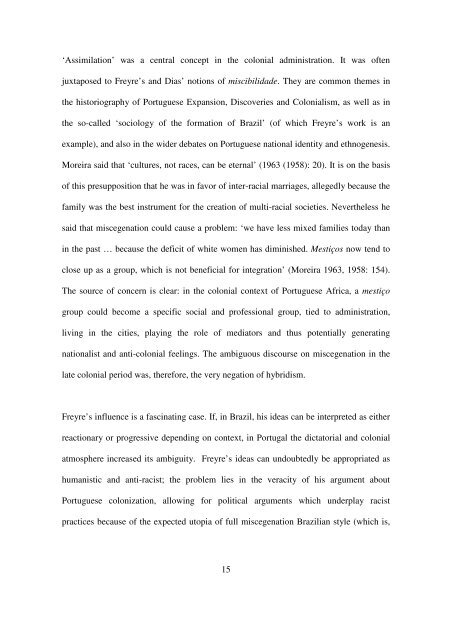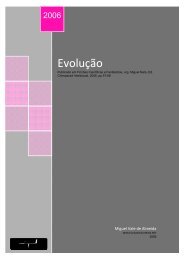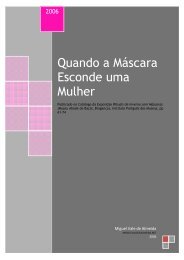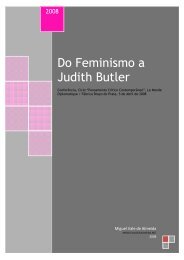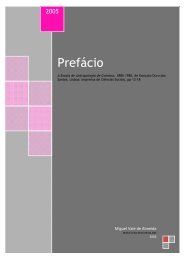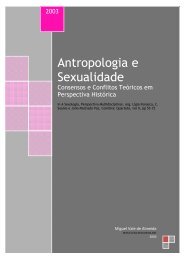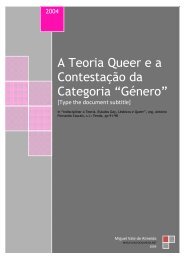On the Lusophone Postcolony: - Miguel Vale de Almeida
On the Lusophone Postcolony: - Miguel Vale de Almeida
On the Lusophone Postcolony: - Miguel Vale de Almeida
You also want an ePaper? Increase the reach of your titles
YUMPU automatically turns print PDFs into web optimized ePapers that Google loves.
‘Assimilation’ was a central concept in <strong>the</strong> colonial administration. It was often<br />
juxtaposed to Freyre’s and Dias’ notions of miscibilida<strong>de</strong>. They are common <strong>the</strong>mes in<br />
<strong>the</strong> historiography of Portuguese Expansion, Discoveries and Colonialism, as well as in<br />
<strong>the</strong> so-called ‘sociology of <strong>the</strong> formation of Brazil’ (of which Freyre’s work is an<br />
example), and also in <strong>the</strong> wi<strong>de</strong>r <strong>de</strong>bates on Portuguese national i<strong>de</strong>ntity and ethnogenesis.<br />
Moreira said that ‘cultures, not races, can be eternal’ (1963 (1958): 20). It is on <strong>the</strong> basis<br />
of this presupposition that he was in favor of inter-racial marriages, allegedly because <strong>the</strong><br />
family was <strong>the</strong> best instrument for <strong>the</strong> creation of multi-racial societies. Never<strong>the</strong>less he<br />
said that miscegenation could cause a problem: ‘we have less mixed families today than<br />
in <strong>the</strong> past … because <strong>the</strong> <strong>de</strong>ficit of white women has diminished. Mestiços now tend to<br />
close up as a group, which is not beneficial for integration’ (Moreira 1963, 1958: 154).<br />
The source of concern is clear: in <strong>the</strong> colonial context of Portuguese Africa, a mestiço<br />
group could become a specific social and professional group, tied to administration,<br />
living in <strong>the</strong> cities, playing <strong>the</strong> role of mediators and thus potentially generating<br />
nationalist and anti-colonial feelings. The ambiguous discourse on miscegenation in <strong>the</strong><br />
late colonial period was, <strong>the</strong>refore, <strong>the</strong> very negation of hybridism.<br />
Freyre’s influence is a fascinating case. If, in Brazil, his i<strong>de</strong>as can be interpreted as ei<strong>the</strong>r<br />
reactionary or progressive <strong>de</strong>pending on context, in Portugal <strong>the</strong> dictatorial and colonial<br />
atmosphere increased its ambiguity. Freyre’s i<strong>de</strong>as can undoubtedly be appropriated as<br />
humanistic and anti-racist; <strong>the</strong> problem lies in <strong>the</strong> veracity of his argument about<br />
Portuguese colonization, allowing for political arguments which un<strong>de</strong>rplay racist<br />
practices because of <strong>the</strong> expected utopia of full miscegenation Brazilian style (which is,<br />
15


